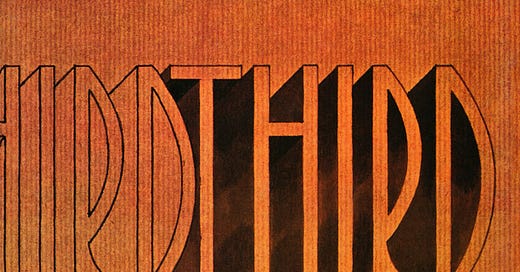Genre of the Day - Canterbury Scene
Album of the Day - Third by Soft Machine (1970)
The Canterbury Tales, published in the 1400s, are often regarded as the first major English-language work to enter into the international literary canon. The Canterbury scene may be a bit less well-known, though it possesses just as much knightly and epic beauty as the stories spun from Kent town. The tales follow a mishmash of characters undertaking a pilgrimage, akin to the lengthy prog-rock of the oddball groups dotting the city’s countercultural music environment. These through lines buttress hundreds of years of history in a completely different artistic setting, though a crypticness underlines both of their existences; there’s debate as to the completion of the Canterbury Tales’ narrative arc, and some raise eyebrows as to whether its scene constituted a truly distinctive genre. For its credit, the city’s name is notorious on both ends, and we undertake a musical pilgrimage of our own to investigate.
The Canterbury Scene arose in the late ‘60s as prog-rock toyed with and extended the boundaries of rock music’s conceptual and epic abilities. A growing cadre of jazz musicians saw the chance to take this feature-film length rock and add free jazz’s improvisational capacities. This school of thought pervaded the town of Canterbury, whose musicians took an irreverent and silly thematic approach contrasting with their musical indulgence. A medieval renaissance (I suppose an oxymoron) was in full swing by that time in English music: Steeleye Span harkened back to the days of yore in folk music, and Monty Python spoofed knight culture in its comedic escapades.
The Canterbury scene lay somewhere in between these trends. The most knowing, best-executed musical humor bears a genuine dedication to the craft of its genre while leaning into its most absurd qualities: for a pop analogue, think of Charli xcx (another Brit hailing form a scenic church town) and her sly yet devoted approach to pop. After deeply meditating on the jazz, prog-rock, and psychedelic fusions that wove together its musical stylings, it’s understandable that musicians left the lyrics up to their fantastical whims. The singing was characterized by a drolly stubborn attribute that manifested in unpolished jazz vocals unapologetically delivered in a British accent.
Soft Machine helped resocialize a generation of prog-rock enthusiasts fans to jazz experimentation through their third effort unsurprisingly dubbed Third. Their band name also acts as an apt descriptor for their music, which makes heavy use of distortion, fuzz, and synthesizer zaniness though with a gorgeous melodic unfurling. Mixing that tonal distortion that evokes harder-edged rock with jazzy riffs is a peculiar yet natural intertwining as in the opening live rendition of “Facelift.” “Slightly All The Time” moves further into capital-j-Jazz territory, with constant, persistent movement and flutes and organ that concurrently dance and gradually build to a fever pitch—by the end, though, avant-garde inwards sine waves feel decades ahead of their time. The increasingly gothic organ solos underscore our lyrical introduction to the band in “Moon in June,” the lyrics simultaneously befuddling and forlorn. These songs are indulgent and lush, though the frenetic bursts of electronic light that end “Out-Bloody-Rageous,” small and delicate yet potent like atoms crashing against one another in a reactor, speaks to continual creative energy even in a town immortalized for its place in historical memory.






Caravan are another "Canterbury Scene" band who recorded some very interesting albums (in particular, 'In The Land of Grey and Pink"). Soft Machine's name was taken from a William Burroughs book.